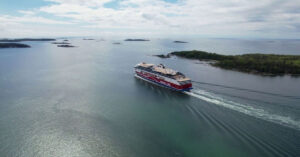
LR & Orbital Marine Power To Begin Certification Of World’s Most Powerful Tidal Energy Converter
September 19, 2024
Watch: U.S. Coast Guard Releases First Public Video Of Titan Submersible Wreckage
September 19, 2024

The Baltic Sea’s first green freight corridor has been opened. The new corridor from Fågelmara, Sweden, to Turku, Finland, has reduced emissions by 90%.
The initiative is a collaboration between Viking Line, Scandic Trans, and Orkla Suomi, which started scheduled freight operations using biofuel in July.
Felix ketchup, produced by the Orkla Group at the Nordic region’s biggest ketchup factory, is now transported using green biofuel over a 683-kilometre route.
Scandic Trans lorries travel from Korsholm to Viking Line’s terminal in Stockholm, then cross the Archipelago Sea on Viking Line’s climate-smart vessels, Viking Glory and Viking Grace. Upon arrival in Turku, the cargo is delivered to Orkla’s logistics center.
The shift from conventional fuels to biofuels has greatly reduced carbon dioxide emissions. A single shipment now emits only 102 kilograms of CO2, compared to 1,512 kilograms previously, resulting in an annual reduction of around 190 tonnes.
The transition to biofuels has benefitted both road and sea transport. Scandic Trans’ lorries run on hydrotreated vegetable oil, while Viking Line’s ships run on liquefied biogas generated from organic waste supplied by Gasum.
Viking Glory and Viking Grace, which usually operate on liquefied natural gas, were built to accommodate future bio and synthetic fuels, thus increasing their sustainability.
According to industry experts, the initiative is essential for the environment. Scandic Trans CEO Mikael Löfqvist talked about the transformative impact of integrating biofuel across the transportation chain, stating that transparency in reporting emissions per mode is crucial for improving the transport sector’s environmental reputation.
Harri Tamminen, Viking Line’s Freight Director, stated that the opening of the green freight corridor has gained huge interest across the Nordic region, expecting that more companies will soon join the sustainability effort.
Viking Line has also been giving passengers and conference attendees biogas options to reduce trip emissions by 90%, showing the company’s commitment to climate-friendly practices.
Reference: Viking Line
Baltic Sea’s First Green Freight Corridor Reduces Transport Emissions By 90% appeared first on Marine Insight – The Maritime Industry Guide
Source: Maritime Shipping News


